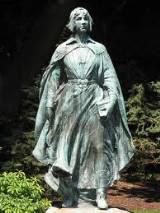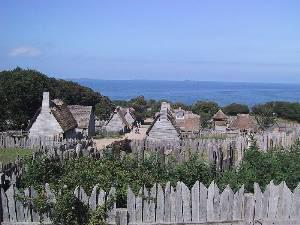Pilgrim Women at Plymouth Colony The Pilgrim Maiden Statue Sculpted by Henry Hudson Kitson Brewster Gardens, Plymouth, Massachusetts Dedicated in 1924 to “those intrepid English women whose courage, fortitude and devotion brought a new nation into being.” In the first years of the 17th century, small numbers of English Puritans broke away from the Church of England and committed themselves to a life based on the Bible. Most of these Separatists were farmers, poorly educated and without social or political standing. The Separatists were persecuted in England, and many fled to Holland where their religious views were tolerated. They remained there for almost 12 years.

